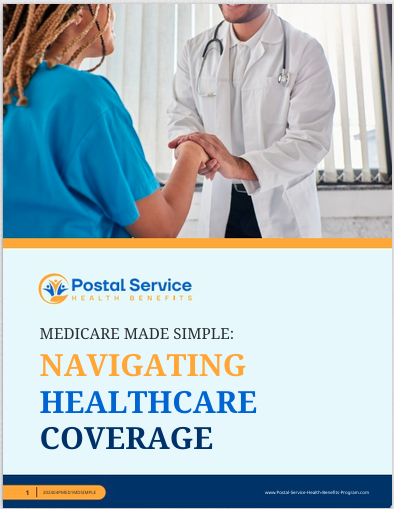Key Takeaways
-
If you opt out of Medicare Part B while enrolled in a PSHB plan in 2025, your out-of-pocket medical expenses could increase significantly, even if your premiums appear lower at first glance.
-
Skipping Medicare Part B may limit your access to enhanced benefits under PSHB plans that coordinate with Medicare, such as waived deductibles or lower cost-sharing.
Understanding the PSHB and Medicare Part B Connection
With the transition to the Postal Service Health Benefits (PSHB) Program in 2025, USPS employees and retirees face important choices regarding Medicare. One of the biggest decisions is whether to enroll in Medicare Part B once you’re eligible.
Medicare Part B covers outpatient medical services, including doctor visits, lab work, and preventive care. Under the PSHB program, many plans are designed to work best when you’re enrolled in both the PSHB plan and Medicare Part B. If you decide to skip Part B, the plan will still provide coverage, but you may not receive the same level of financial protection or access to enhanced benefits.
Let’s explore what happens if you choose to skip Medicare Part B.
1. You May Pay More Out of Pocket
Even though skipping Medicare Part B might seem like a way to save money on monthly premiums, it can lead to higher costs in the long run. Here’s why:
-
Without Medicare Part B, you’ll rely solely on your PSHB plan to cover outpatient services.
-
PSHB plans often have higher deductibles, copayments, and coinsurance when they operate alone.
-
You may be responsible for 100% of the cost until your deductible is met, and then a percentage of the bill afterward.
Some PSHB plans offer reduced out-of-pocket expenses when coordinated with Medicare Part B. Without Part B, you lose that coordination and those savings.
2. You Could Be Missing Out on Integrated Prescription Drug Coverage
In 2025, PSHB plans automatically include Medicare Part D coverage through an Employer Group Waiver Plan (EGWP) if you’re enrolled in Medicare Part B. This integration comes with several perks:
-
A $2,000 annual out-of-pocket maximum on prescription drug costs
-
Access to an expanded pharmacy network
-
Reduced costs for brand-name and specialty drugs
If you skip Medicare Part B, you can’t enroll in the Part D coverage through your PSHB plan, and your drug benefits will be limited to what the PSHB plan provides outside Medicare. This may result in fewer drug choices, higher copays, and no $2,000 cap.
3. Your Cost-Sharing May Be Higher Across the Board
Many PSHB plans waive or reduce deductibles and copayments if you’re also enrolled in Medicare Part B. Without that enrollment:
-
You may pay full copayments for primary care and specialist visits.
-
Deductibles may apply to all outpatient services, including preventive care.
-
Emergency room visits and outpatient procedures may come with higher coinsurance.
In other words, Medicare Part B acts as a secondary payer that absorbs some of these costs. Without it, you’re bearing the brunt of the bill.
4. Your PSHB Plan Choices Could Be Limited Over Time
In 2025, you’re not forced to enroll in Medicare Part B if you were retired by January 1, 2025. However, if you’re a current USPS employee or retiree who becomes eligible for Medicare after this date, PSHB requires you to enroll in Medicare Part B to maintain full PSHB coverage.
If you opt out:
-
You’ll still be enrolled in a PSHB plan, but some benefits may be limited.
-
You won’t be eligible for certain plan perks that are Medicare-integrated.
-
You could face restrictions if you later decide to enroll in Part B during a future enrollment period.
5. Re-Enrolling Later Comes With Penalties
If you skip Part B now and try to enroll later, you may face the following consequences:
-
Late Enrollment Penalty: Your monthly premium for Part B will go up by 10% for every 12-month period you were eligible but didn’t sign up. This penalty is permanent.
-
Limited Enrollment Period: You can only enroll during the General Enrollment Period (January 1 to March 31 each year), and your coverage won’t begin until July.
This could leave you without adequate medical coverage for months and with lifelong higher premiums.
6. You May Lose Access to Certain Benefits
Some PSHB plans offer enhanced features for enrollees with Medicare Part B. These include:
-
Lower hospital coinsurance
-
Reduced specialist copays
-
Full coverage for preventive screenings and lab tests
If you don’t have Medicare Part B, these benefits may not apply, or you may receive a less generous version.
In short, skipping Part B could downgrade your overall benefit package.
7. You’re on Your Own for Coordination of Benefits
Medicare Part B and PSHB plans often coordinate automatically to ensure that claims are paid properly. Without Medicare, you may need to:
-
File claims manually
-
Dispute denied services
-
Track deductibles and out-of-pocket expenses on your own
This lack of coordination can be burdensome, especially if you require frequent medical services.
8. There Are Long-Term Financial Trade-Offs
It’s tempting to look at the monthly cost of Medicare Part B and decide it’s not worth it. But skipping it means you’ll likely:
-
Pay more when you need care
-
Miss out on enhanced benefits
-
Have fewer plan options in the future
In the long term, the financial burden may outweigh the upfront savings. By enrolling in Part B now, you protect yourself from unexpected high costs and penalties later.
9. Timing and Eligibility Are Crucial
You become eligible for Medicare Part B at age 65. Under the PSHB program in 2025:
-
If you were retired on or before January 1, 2025, you are not required to enroll in Part B to keep PSHB coverage.
-
If you are still working or retire after January 1, 2025, and are eligible for Medicare, you must enroll in Part B to keep your full PSHB benefits.
Missing this enrollment could mean reduced PSHB benefits or gaps in coverage. Pay close attention to your timeline.
10. There Are Some Exceptions, But They’re Limited
There are a few cases where you can skip Medicare Part B without penalty or coverage loss:
-
You live overseas
-
You receive care through the VA or Indian Health Services
-
You were retired before January 1, 2025
However, even in these cases, skipping Part B means you won’t get the extra cost-sharing help that comes with Medicare coordination.
Weighing Your PSHB and Medicare Options in 2025
Now that the PSHB program is in full effect, it’s more important than ever to think through your Medicare choices. If you’re nearing Medicare eligibility or already eligible, skipping Part B might seem like a way to cut costs, but it often comes at a price.
Lower plan benefits, higher out-of-pocket expenses, and future penalties can quickly wipe out any perceived savings. Unless you’re exempt, enrolling in Medicare Part B is the safer path to ensure you’re fully covered under the PSHB program.
If you need help evaluating your situation, speak with a licensed agent listed on this website for professional guidance.






